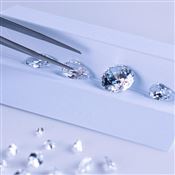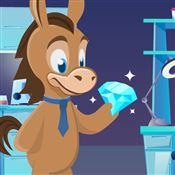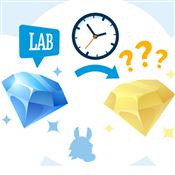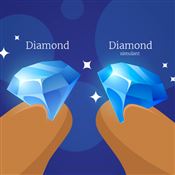Conflict Diamonds: Facts You Need to Know
Conflict diamonds are those mined to help fund civil wars. Learn more about this critical issue and how you can avoid buying one.
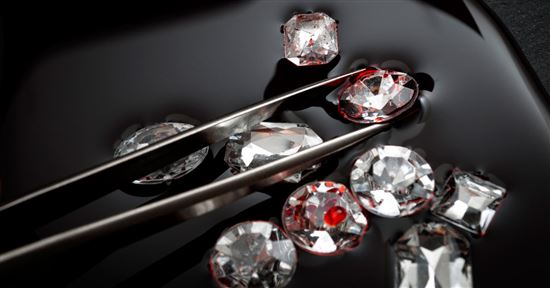 |
Diamonds symbolize love for us. But for many others, they mean war and pain.
Unfortunately, diamond purchases go beyond just the 4 C's. Blood diamonds are a major concern today. Unless you know a diamond's origin, your money could be helping fund civil wars in Africa.
Not only that, but many diamonds come from mines with child labor and unsafe working conditions.
Let's get into more detail.
What Is a Blood Diamond?
Blood diamonds are those mined in conflict areas. The revenue is used by rebel groups to fund civil wars. They're often associated with violence and the violation of human rights.
Diamonds played these vital roles:
- Rival groups fight for control of the diamond mines.
- Diamonds help fund the rebel military to continue the war.
- Thousands of civilians, including children, are forced to work in the mines as slaves.
- Millions of civilians' lives are lost as a result of the wars.
Blood Diamonds in Africa
Conflicts mostly occurred in central and Western Africa in the 1990s. The countries include:
- Angola
- Democratic Republic of Congo
- Ivory Coast
- Liberia
- Republic of Congo
- Sierra Leone
At the height of the wars, it was estimated that about 4% of the world's diamonds were from conflict areas.
Today, efforts have been put in place to stop the trade of conflict diamonds. As a result, it's estimated blood diamonds make up about 1% of the world's diamond production now.
The Prevention of Blood Diamonds
The good news is governments are doing things to prevent blood diamonds. But it's not always enough. Illegal smuggling and covering up poor tactics still exist.
In 2000, two nonprofit agencies began shedding light on conflict diamonds. Global Witness and Partnership Africa Canada began spreading the story of blood diamonds. They let the public know that the diamonds they bought helped fuel wars.
People became aware that their diamonds have bloodshed on them. This took away the sentiment of "Diamonds are Forever."
The Kimberley Process
The diamond industry created the Kimberley Process. This is meant to make sure that the import/export of rough diamonds is not from conflict areas. 81 national governments jumped onboard.
Here are some facts about it:
- The process requires evaluation of the diamond-producing territory.
- Each shipment must have a Kimberley certificate that states the area is conflict-free.
- Only countries that implemented the Kimberley Process can legally export diamonds.
In 2003, President Bush passed the Clean Diamond Trade Act in the United States. This made the Kimberley Process a part of the import/export of diamonds in the U.S. The idea was to help prevent the sale of blood diamonds in the country.
Why the Kimberley Process Isn't Enough
Unfortunately, the Kimberley Process doesn't acknowledge all issues. It only bans diamonds from conflict areas. This definition only covers "rough diamonds used to finance wars against governments."
But there are still other concerns, including:
- Child labor
- Inhumane and unsafe working conditions
- Unfair wages (often none at all)
- Sexual exploitation
- Smuggling of diamonds to conflict-free areas
Diamonds from these kinds of mines are still allowed by the Kimberley Process. As long there's no presence of rebel groups.
In addition, this process only applies to rough diamonds. As soon as a diamond has been cut and polished, it's out of Kimberley Process' hands.
So how do you prevent the purchase of a conflict diamond?
How to Avoid Purchasing a Blood Diamond
The Kimberley Process isn't as transparent as other fair trade practices. You can still avoid the purchase of a conflict diamond. Here are some ways:
Talk to Your Jeweler
Have an open dialogue with your jeweler. Ask him outright where the diamonds originated. The jeweler should be able to trace the diamond from the mine to their store. If they can't, we suggest you move on.
Consider Brilliant Earth
Brilliant Earth was founded on a principle beyond just conflict-free. They source their diamonds from mines with fair wages and without human rights issues.
They also donate 5% of their proceeds to help economic development in diamond mining areas in Africa. They focus on areas that suffer from poor mining practices.
They even started an initiative to build schools and provide education for children. So they don't have to work in the mines.
Buy Diamonds from Fair Areas
You can also specifically search for diamonds from areas that engage in fair labor practices. For instance, diamonds mined from Canada. The governments in Botswana and Namibia also impose labor and environmental requirements on mines.
Ask for the System of Warranties
One thing you can ask for is the System of Warranties. This paper trail certifies that the diamond is conflict-free.
The Kimberley Process only affects the import/export of diamonds. Once cut and polished, it loses the power of the Kimberley Process. The System of Warranties continues the paper trail to the retail store.
Each person handling the diamond must complete the statement that the diamond was purchased through legitimate sources. This creates the paper trail necessary for conflict-free diamonds.
Alternatives to Blood Diamonds
If you'd rather avoid questionable diamonds altogether, here are some alternatives:
Lab-Created Diamonds
Lab diamonds prevent the exploitation issues. Instead of being mined from the Earth, these diamonds grow in a lab. As a bonus, they often cost less than mined diamonds.
Buy Antique
Antique diamonds offer sentiment and safety. Jewelers can change the look and even the shape of these diamonds. You can also pick another setting suited to your style. You can achieve a modern look even with an antique diamond.
Diamond Alternatives
Moissanite and cubic zirconia provide the strongest alternatives. Both are man-made and mimic the look of a diamond. They are also often much less expensive than a real diamond.
Bottom Line
Buying the right diamond is a personal choice.
Nobody can tell you right from wrong. But it's important to know the facts before deciding to purchase a blood diamond.
It's best to talk to your loved one. See where they stand on the conflict diamond. Then you can proceed, shopping at the stores you know don't sell blood diamonds.
Write to Kim P at feedback@creditdonkey.com. Follow us on Twitter and Facebook for our latest posts.
Note: This website is made possible through financial relationships with some of the products and services mentioned on this site. We may receive compensation if you shop through links in our content. You do not have to use our links, but you help support CreditDonkey if you do.
|
|
| ||||||
|
|
|

